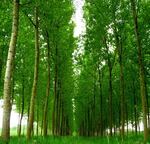Humans like their yogurt and new research indicates the trees that clean up toxic waste stand to benefit from probiotics too.
Poplar trees clean groundwater by taking up the carcinogen trichloroethylene, or TCE, and breaking it down into harmless salts. TCE is one of the most common groundwater pollutants in the country and is found in multiple sites in the Pacific Northwest, including the Duwamish River.

Poplar trees that help clean up toxic waste can stand to benefit from probiotics, according to new research.
Luciano/Flickr
But there's a catch.
"When the pollutant is at too high of a concentration or there are other mixed pollutants" then the poplars can become "stunted and don't do well," said Sharon Doty, a researcher at the University of Washington.
That's why Doty worked with other researchers to find a bacteria that could help poplars break down TCE.
Then they put poplar trees in buckets of bacteria-laced water before planting them at a Superfund site.
The bacteria-treated trees were able to break down more of the pollutant and to grow taller and healthier than the other poplars planted at the site.
Lee Newman, a researcher at the State University of New York who was not involved in the research, said this is a big step forward.
"The better we can make the technologies that are involved in cleaning up these sites, the more they're going to be used and the more sites are going to be cleaned up," she said.
Newman said probiotic-treated poplars are a pretty cost-effective way to clean up toxic waste.
